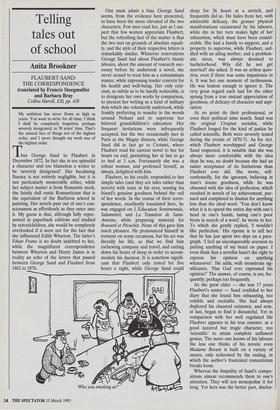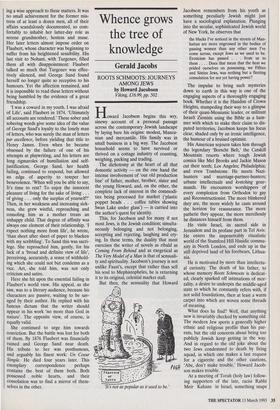Telling tales out of school
Anita Brookner
FLAUBERT-SAND: THE CORRESPONDENCE translated by Francis Steegmuller and Barbara Bray Collins Harvill, £20, pp. 428
My ambition has never flown as 14h as yours. You want to write for all time; I think I shall be completely forgotten, perhaps severely denigrated, in 50 years' time. That's the natural fact of things not of the highest order, and I never thought my work was of the highest order.
Thus George Sand to Flaubert in December 1872. In fact she is too splendid a character and too blameless a writer to be 'severely denigrated'. Her becalming fluency is not entirely negligible, but it is not particularly memorable either, while her subject matter is from Romantic stock, the faintly dull rustic Romanticism that is the equivalent of the Barbizon school in painting. Her novels pass out of one's con- sciousness as effortlessly as they enter into it. My guess is that, although fully repre- sented in paperback editions and studied by schoolchildren, she would be completely overlooked if it were not for the fact that she influenced Edith Wharton. The latter's Ethan Frome is no doubt indebted to her, while the magnificent correspondence between Wharton and Henry James is in reality an echo of the letters that passed between George Sand and Flaubert from 1862 to 1876. One must admit a bias. George Sand seems, from the evidence here presented, to have been the more elevated of the two characters. Few men read her, just as I sus- pect that few women appreciate Flaubert, but the refreshing fact of the matter is that the two met on grounds of absolute equali- ty, and the style of their respective letters is remarkably similar. Whatever reservations George Sand had about Flaubert's titanic labours, about the amount of research nec- essary before he undertook a novel, she never ceased to treat him as a consummate master, while expressing tender concern for his health and well-being. Her only criti- cism, so subtle as to be hardly noticeable, is to denigrate her own works by comparison, to present her writing as a kind of military duty which she voluntarily undertook, while frankly preferring to wander in the woods around Nohant and to supervise her beloved grandchildren's education. Her frequent invitations were infrequently accepted, but the two occasionally met in Paris at the Magny dinners, while George Sand did in fact go to Croisset, where Flaubert read his current novel to her for hours on end, permitting her at last to go to bed at 3 a.m. Fortunately she was a robust woman, and professed herself, as always, delighted with him.
Flaubert, to his credit, responded,to her simple tales (and they are tales rather than novels) with tears in his eyes, sensing his friend's genuine goodness behind the veil of her words. In the course of their corre- spondence, excellently translated here, he was engaged on L'Education Sentimentale, Salammbii, and La Tentation de Saint- Antoine, while preparing material for Bouvard et Pecuchet. None of this gave him much pleasure. He pronounced himself in torment on many occasions, but his art was literally his life, so that we find him eschewing company and travel, and cutting down his hours of sleep in order to accom- modate his daemon. It is somehow signifi- cant that Flaubert only rested for five hours a night, while George Sand could Who you smoking at?' sleep for 36 hours at a stretch, and frequently did so. He hides from her, with admirable delicacy, the grosser physical manifestations occasioned by his labours, while she in her turn makes light of her exhaustion, which must have been consid- erable. She had a family to support, and a property to supervise, while Flaubert, sad- dled with an ailing mother, and a problem- atic niece, was always doomed to bachelorhood. Why did he not get married? she asked. It was an artless ques- tion, even if there was some impatience in it. It was her one moment of tactlessness. He was lenient enough to ignore it. The very great regard each had for the other sprang from a true mutual appreciation of goodness, of delicacy of character and aspi- ration.
At no point do their professional, or even their political aims match. Sand was the original Utopian socialist, while Flaubert longed for the kind of justice he called scientific. Both were severely tested during the events of 1870-71. As for Art, which Flaubert worshipped and George Sand respected, it is notable that she was always more comfortable with the idea than he was, no doubt because she had an easier acceptance of its limitations than Flaubert ever did. She wrote, self- confessedly, for the ignorant, believing in man's innate goodness, while he was obsessed with the idea of perfection, which resulted in novels of icy achievement, pur- sued and completed in disdain for anything less than the ideal word. 'You don't know what it is to spend the entire day with one's head in one's hands, taxing one's poor brain in search of a word', he wrote to her. To which she gently replied, 'I wouldn't like perfection.' His riposte is to tell her that he has just spent two days on a para- graph. 'I feel an unconquerable aversion to putting anything of my heart on paper. I even think that a novelist hasn't the right to express his opinion on anything whatsoever'. He adds, with monstrous sig- nificance, 'Has God ever expressed his opinion?' The answer, of course, is yes, fre- quently; perhaps too frequently.
As she grew older — she was 17 years Flaubert's senior — Sand confided to her diary that she found him exhausting, too voluble and excitable. She had always deplored his claustral existence, and now, at last, began to find it distasteful. Yet in comparison with her well regulated life Flaubert appears in his true essence: as a good natured but tragic character, too `scientific' to attain complete unflawed genius. The more one knows of his labours the less one thinks of his novels: even Madame Bovary is built on a variety of sneers, only redeemed by the ending, in which the author's frustrated romanticism breaks loose.
Whereas the limpidity of Sand's compo- sitions almost recommends them to one's attention. They will not monopolise it for long. Yet hers was the better part, disclos- ing a wise approach to these matters. It was no small achievement for the former mis- tress of at least a dozen men, all of their affairs scandalously documented, so com- fortably to inhabit her latter-day role as serene grandmother, hostess and muse. Her later letters almost impose order on Flaubert, whose character was beginning to suffer from his heightened sensibility. His last visit to Nohant, with Turgenev, filled them all with disappointment: Flaubert talked so much that Turgenev was effec- tively silenced, and George Sand found herself no longer quite so receptive to his humours. Yet the affection remained, and it is impossible to read these letters without being humbled by the evidence of a great friendship.
'I was a coward in my youth. I was afraid of Life', said Flaubert in 1874. 'Ultimately all accounts are rendered.' These sober and sobering words give some idea of the value of George Sand's loyalty to the lonely man of letters, who was surely the man of letters par excellence, before yielding that title to Henry James. Even when he became obsessed by the failure of one of his attempts at playwriting, and his letters are long rigmaroles of humiliation and self- justification, George Sand, her health failing, continued to respond, but allowed an edge of asperity to temper her benevolence. 'When will you be able to say, It's time to rest? To enjoy the innocent pleasure of living for the sake of living . . . of giving . . . only the surplus of yourself?' Then, in her weakness and increasing sick- ness, she grew wistful, reproaching and consoling him as a mother treats an unhappy child. That degree of affinity was always one element of their relationship. 'I expect nothing more from life', he wrote, 'than sheet after sheet of paper to blacken with my scribbling'. To Sand this was sacri- lege. She reproached him, gently, for his lack of a 'broad and definite view of life', perceiving, accurately, a sense of withhold- ing which she could not but condemn as a vice. Art, she told him, was not only criticism and satire.
Here she hit upon the essential failing in Flaubert's world view. His appeal, as she saw, was to a literary audience, because his characters are passive, waiting to be sav- aged by their author. He replied with his famous dictum that the writer should appear in his work `no more than God in nature'. The opposite view, of course, is equally valid.
She continued to urge him towards conviction. But the battle was lost for both of them. By 1876 Flaubert was financially ruined and George Sand near death. His tribute to her was posthumous, and arguably his finest work: Un Coeur Simple. He died four years later. This exemplary correspondence perhaps contains the best of them both. Both possessed noble hearts, and their consolation was to find a mirror of them- selves in the other.



























































 Previous page
Previous page